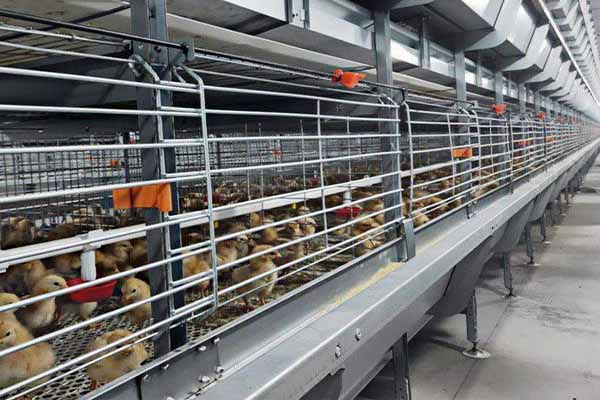How to Start a Chicken Egg Farm: A Comprehensive Guide
Time : 2025-06-25
Starting a chicken egg farm can be a rewarding venture, offering fresh, organic eggs to local markets and consumers. However, it’s important to approach this venture with thorough planning and a solid understanding of the industry. This guide will walk you through the essential steps to start a chicken egg farm, from selecting the right breed to setting up your farm with professional equipment.

1. Market Research and Planning
Before diving into the wor ld of chicken egg farming, it’s crucial to conduct thorough market research and create a comprehensive business plan.
ld of chicken egg farming, it’s crucial to conduct thorough market research and create a comprehensive business plan.
1.1 Market Research
- Identify Your Target Market: Determine who your customers will be, whether it’s local restaurants, grocery stores, or direct-to-consumer sales.
- Competitor Analysis: Research existing chicken egg farms in your area to understand their pricing, product offerings, and market share.
- Regulatory Requirements: Familiarize yourself with local, state, and federal regulations regarding egg farming, including zoning laws, sanitation standards, and food safety regulations.
1.2 Business Plan
Your business plan should include the following elements:
- Executive Summary: A brief overview of your farm’s mission, goals, and financial projections.
- Company Description: Details about your farm’s business model, including the type of chickens you’ll raise and the scale of your operation.
- Market Analysis: Information about your target market, competitors, and market trends.
- Organization and Management: Descriptions of your farm’s organizational structure, management team, and key personnel.
- Service or Product Line: A detailed description of the chickens you’ll raise and the eggs you’ll produce.
- Marketing and Sales Strategy: How you plan to market your eggs and reach your target audience.
- Funding Request: Information about the capital you need to start your farm and how you plan to use it.
- Financial Projections: Detailed financial forecasts, including startup costs, operating expenses, revenue projections, and cash flow statements.
2. Selecting the Right Breed
The choice of chicken breed will significantly impact your farm’s success. Consider the following factors when selecting a breed:
2.1 Egg Production
- Layer Breeds: These chickens are bred specifically for egg production and are known for their high laying rates.
- Hybrid Breeds: Crossbreeds that combine the traits of different breeds for improved egg production and other desirable characteristics.
2.2 Growth Rate and Size
- Broiler Breeds: These chickens grow quickly and are typically used for meat production, but they can also lay eggs.
- Layer Breeds: These chickens are bred to reach maturity at a slower pace, which can be beneficial for egg production.
2.3 Hardiness and Adaptability
- Climate适应性: Choose a breed that is well-suited to your local climate and can withstand temperature extremes.
- Disease Resistance: Select a breed that is naturally resistant to common poultry diseases to minimize health risks and veterinary costs.
3. Setting Up Your Farm
Once you’ve selected your breed, it’s time to set up your farm with the necessary infrastructure and equipment.
3.1 Land and Location
- Proximity to Markets: Choose a location that is close to your target market to reduce transportation costs and ensure freshness.
- Zoning and Regulations: Ensure that your chosen location complies with local zoning laws and regulations for egg farming.
3.2 Housing and Coops
- Size and Design: Design your coops to accommodate the number of chickens you plan to raise, with ample space for movement and nesting boxes.
- Airflow and Ventilation: Ensure good airflow to keep the chickens cool and prevent diseases.
- Insulation and Heat: Insulate your coops to maintain a comfortable temperature for the chickens, especially during colder months.
3.3 Feeding and Watering Systems
- Automated Feeders: Invest in high-quality automated feeders to ensure consistent and efficient feeding.
- Waterers: Provide automatic waterers with a constant supply of clean water for the chickens.
3.4 Equipment and Tools
- Incubators: Use professional incubators to hatch your chickens from eggs.
- Brooders: Provide brooders for young chicks to keep them warm until they can regulate their body temperature.
- Manure Removal Systems: Implement a system for collecting and managing manure to maintain a clean and healthy environment.
- Regular Health Checks: Schedule regular veterinary checks to monitor the health of your chickens.
- Sanitation: Maintain clean coops and equipment to prevent the spread of diseases.
- Feed Quality: Provide high-quality feed to ensure your chickens produce healthy eggs.
- Regular Collection: Collect eggs at least twice a day to ensure freshness.
- Handling Techniques: Use proper techniques to handle eggs to prevent cracks and contamination.
- Inventory Logs: Keep detailed records of your chickens, feed, and equipment.
- Financial Records: Track all financial transactions, including expenses and revenue.
- Unique Selling Proposition (USP): Identify what sets your farm apart from competitors and emphasize this in your branding.
</ul >
>
4. Managing Your Chicken Egg Farm
Effective management is key to the success of your chicken egg farm.
4.1 Health and Welfare
4.2 Egg Collection and Handling
4.3 Record Keeping
5. Marketing and Sales
Develop a robust marketing and sales strategy to ensure your eggs reach your target market.











